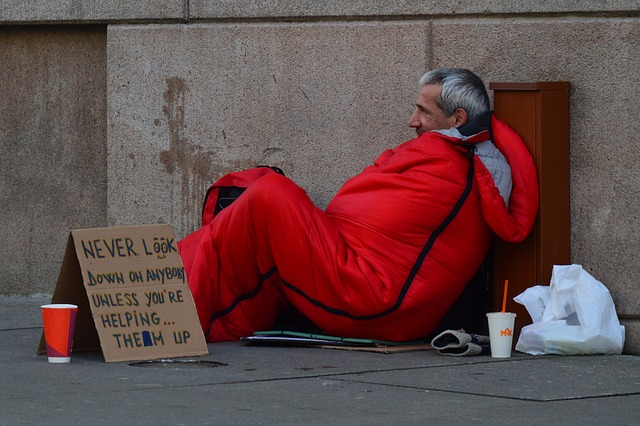- Calls to this hotline are currently being directed to Within Health, Fay or Eating Disorder Solutions
- Representatives are standing by 24/7 to help answer your questions
- All calls are confidential and HIPAA compliant
- There is no obligation or cost to call
- Eating Disorder Hope does not receive any commissions or fees dependent upon which provider you select
- Additional treatment providers are located on our directory or samhsa.gov
Homelessness and Eating Disorders: Treatment and Recovery Options

Contributor: Jennifer Rollin, MSW, LGSW, writer for Eating Disorder Hope
Eating disorder treatment can become incredibly expensive for individuals who are struggling. According to The Eating Disorders Coalition, “Treatment of an eating disorder in the US ranges from $500 per day to $2,000 per day.
Outpatient treatment, including therapy and medical monitoring, can cost $100,000 or more.” Additionally, the research indicates that only “1 in 10 people with eating disorders receive treatment.” [1]
For individuals who are homeless or who are struggling financially-eating disorder treatment options are even more limited. However, there are some great resources that are low-cost and free, which can be utilized by everyone who is struggling-regardless of their financial means. The following are some suggestions in regards to free/low-cost eating disorder treatment and recovery resources.
1. Get matched with a mentor through MentorConnect
MentorConnect is a completely free online resource-where an individual who is struggling with an eating disorder can request to be matched with a mentor who is in strong recovery and who will communicate with them a minimum of 1 hour a week. MentorConnect’s volunteer mentors are “extensively pre-screened by a team of lay and licensed professionals.” [2]
Additionally, MentorConnect offers a free pro-recovery chat, as well as message boards. It’s important to note that MentorConnect is not a substitute for therapy or clinical treatment; rather it is a peer-based form of support.
For more information check out their website:
http://www.mentorconnect-ed.org
2. Apply for a treatment grant with Project Heal
Project Heal is an incredible organization, which “funds inpatient, residential, intensive outpatient, and outpatient treatment for applicants suffering from an eating disorder who want to recover but cannot afford treatment. Applicants are asked to indicate their desired level of treatment, preferences for place of treatment, and why, directly on the application.” [3]
To learn more and fill out an application for a treatment grant visit their website:
http://theprojectheal.org/apply-for-grants/our-scholarship-progra/
3. Contact the NEDA Information & Referral Helpline
You can either call the helpline at 800-931-2237 or you can visit their website to chat with a helpline operator. They can help you to find low-cost, sliding scale, or free resources in your area for outpatient, inpatient, or residential eating disorder treatment. The helpline’s hours are Monday-Thursday from 9:00 am to 9:00 pm and Friday from 9:00 am to 5:00 pm (EST).
To learn more about the helpline visit their website:
http://www.nationaleatingdisorders.org/information-referral-helpline
4. Find a local Eating Disorder Anonymous Meeting.
Eating disorder anonymous support groups are not a substitute for clinical treatment-however they are a free recovery resource.
According to their website, “Eating Disorders Anonymous (EDA) is a fellowship of individuals who share their experience, strength and hope with each other that they may solve their common problems and help others to recover from their eating disorders…The only requirement for membership is a desire to recover from an eating disorder. There are no dues or fees for EDA membership.” [4]
In addition to offering meetings in numerous locations-both in The United States and internationally, eating disorder anonymous also offers online and phone meetings.
For more information and to locate a meeting check out their website:
http://www.eatingdisordersanonymous.org/meetings.html
Although eating disorder treatment can be expensive-there are some available options for free or low-cost support and resources. If you are struggling with an eating disorder it is so important to reach out and seek help. You deserve recovery and there is help and support available-regardless of your financial circumstances. No one chooses to have an eating disorder-but you can make the choice to reach out and seek help when you are struggling.
Community Discussion – Share your thoughts here!
What resources would you recommend for someone struggling financially as well as struggling with an eating disorder?
 About the author: Jennifer Rollin, MSW, LGSW is a therapist, body-image activist, and writer who specializes in working with adolescents, body image concerns, survivors of trauma, and mood disorders. Jennifer is a blogger for The Huffington Post and Psychology Today, as well as a contributing writer for Eating Disorder Hope. For body-positive, self-love, inspiration, “like” her on Facebook at Jennifer Rollin, MSW, LGSW.
About the author: Jennifer Rollin, MSW, LGSW is a therapist, body-image activist, and writer who specializes in working with adolescents, body image concerns, survivors of trauma, and mood disorders. Jennifer is a blogger for The Huffington Post and Psychology Today, as well as a contributing writer for Eating Disorder Hope. For body-positive, self-love, inspiration, “like” her on Facebook at Jennifer Rollin, MSW, LGSW.
References:
- http://www.eatingdisorderscoalition.org/
- http://www.mentorconnect-ed.org/
- http://theprojectheal.org/
- http://www.eatingdisordersanonymous.org
The opinions and views of our guest contributors are shared to provide a broad perspective of eating disorders. These are not necessarily the views of Eating Disorder Hope, but an effort to offer discussion of various issues by different concerned individuals.
We at Eating Disorder Hope understand that eating disorders result from a combination of environmental and genetic factors. If you or a loved one are suffering from an eating disorder, please know that there is hope for you, and seek immediate professional help.
Last Updated & Reviewed By: Jacquelyn Ekern, MS, LPC on January 27, 2016
Published on EatingDisorderHope.com

The EatingDisorderHope.com editorial team comprises experienced writers, editors, and medical reviewers specializing in eating disorders, treatment, and mental and behavioral health.

